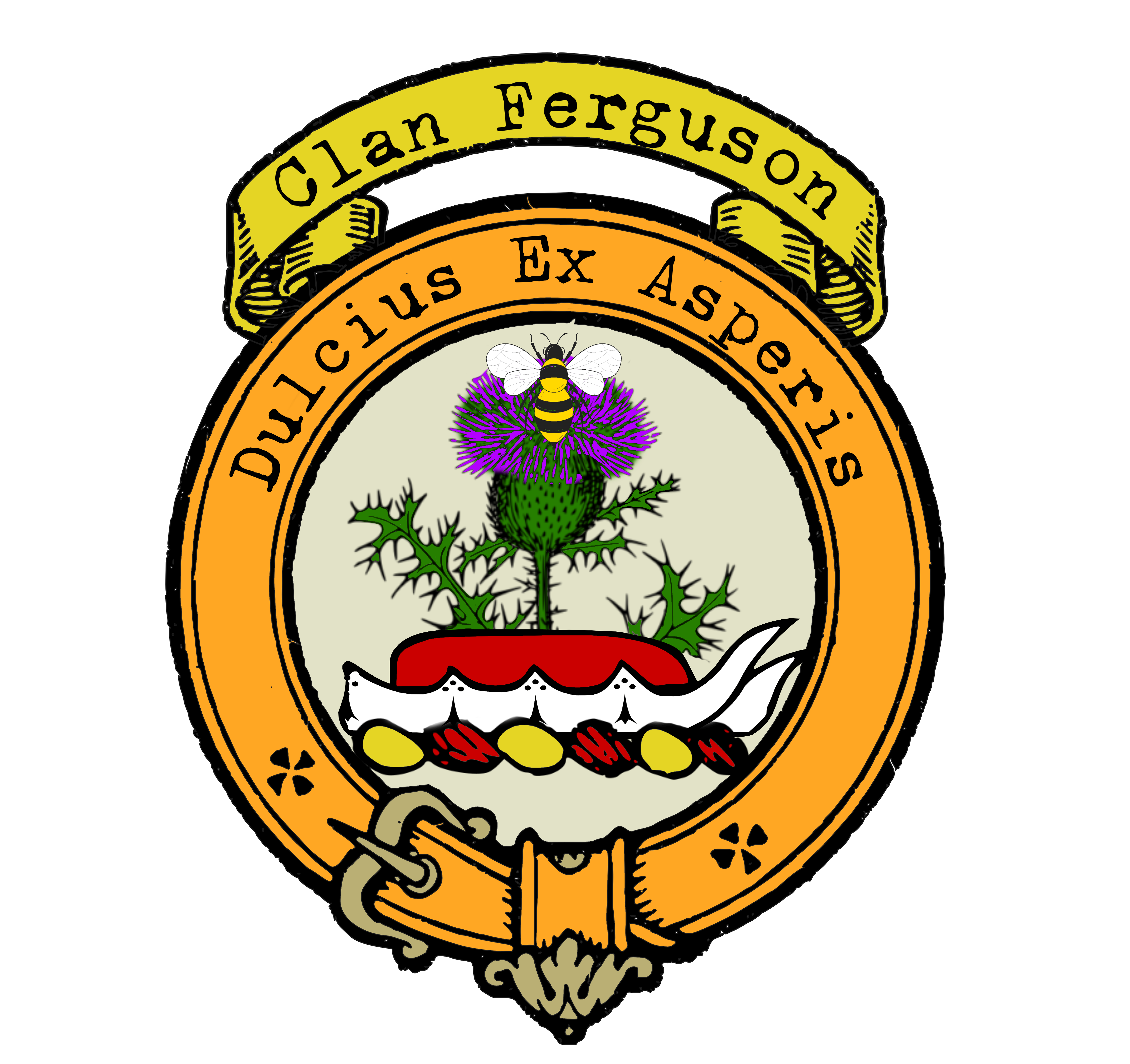Ferguson Clan
|
|
CREST: Upon a chapeau Gules furred Ermine, a bee on a thistle Proper MOTTO: Dulcius ex asperis TRANSLATION: Sweeter after difficulties TARTAN: Blue and Black ground, Green checks, White and Red lines. VARIATIONS: Fergusson |
 The Scottish Clan Ferguson is a fascinating and storied group with a rich history that spans centuries. From the early kings of Scotland to the Jacobite rebellions and beyond, the Fergusons have played a significant role in Scottish history and culture. The Scottish Clan Ferguson is a fascinating and storied group with a rich history that spans centuries. From the early kings of Scotland to the Jacobite rebellions and beyond, the Fergusons have played a significant role in Scottish history and culture.
The origins of the Ferguson name can be traced back to the Gaelic patronymic “MacFhaerghuis,” which translates to “son of the angry” or “son of the bold and proud.” While there is no concrete evidence of a common ancestry among the various Ferguson families, there are connections to early Scottish kings and other important figures. One branch of the Fergusons, the Argyllshire Fergussons, claim descent from Fergus Mor mac Erc, an early king of the Scots of Dalriada. Their heraldry features boars’ heads, which indicate a connection to the early Scots who came from Ireland across Argyll. Another branch of the Fergusons, those living in Ayrshire and Dumfries, are linked to Fergus, Prince of Galloway, an important figure in the reigns of David I and Malcolm IV. He founded the Abbey of Dundrennan and died in the Abbey of Holyrood in 1161. The Earls of Carrick descended from this Fergus. The Fergusons of Kilkerran held the lands of Kilkerran from at least the 12th century. They were involved in various feuds and skirmishes, and many of them adopted the Protestant faith during the Reformation. Sir John Fergusson of Kilkerran fought for the royalist cause in the civil war, but the Kilkerran estates fell heavily into debt and were later restored by Sir John’s grandson, who became a distinguished lawyer and a member of the Faculty of Advocates. His son became a judge of the Supreme Court. The Fergusons of Dunfallandy may have a separate descent, but their heraldry proclaims them as cadets of the principal house of which Kilkerran is the recognized head. They were ardent Jacobites who came out in both the Fifteen and the Forty-five, and Dunfallandy himself was captured but fortunate to escape execution. General Archibald Fergusson of Dunfallandy served in India under the East Indian Company and was wounded at the Battle of Seringapatam in 1799. Other distinguished branches of the family include the Fergussons of Pitfour, one of whom became a High Court judge with the title of “Lord Pitfour” and whose son invented the first breach-loading rifle used by the British army. Ronald Fergusson of Raith, Viscount Novar, was an MP and Governor General of Australia, and his ancestor, General Sir Ronald Fergusson, was a distinguished soldier praised by the Duke of Wellington. In addition to their many accomplishments, the Fergusons were also known for their cultural contributions. Robert Fergusson, a poet admired by Robert Burns, took his work as a model, and other Fergusons have been judges, lawyers, soldiers, and politicians throughout history. In conclusion, the Scottish Clan Ferguson is a remarkable group with a rich and varied history. From early Scottish kings to cultural figures and political leaders, the Fergusons have made significant contributions to Scottish history and culture over the centuries. Their story is one of perseverance, dedication, and achievement, and it continues to be an important part of Scottish heritage today. |
|
Citations:
|
|

Purchase @ Redbubble
Purchase @ Amazon.com
Purchase @ Amazon.co.uk

